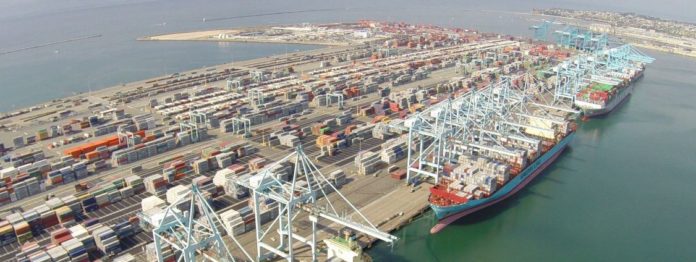Shipping giant A.P. Moller-Maersk shut down its operations at the Port of Los Angeles’ largest terminal Tuesday morning after a cyberattack hobbled its computer systems worldwide.
The closure happened around 6 a.m. at APM Terminals at Pier 400, where Maersk’s operations in Southern California are based, said port spokesman Phillip Sanfield. Maersk is the primary shipper at the terminal and is the port’s largest shipping company by cargo volume, he said.
One Maersk vessel was able to depart early Tuesday morning as scheduled, and no other ships were scheduled to leave Tuesday or Wednesday, Sanfield said.
However, the terminal appeared to be mostly unstaffed Tuesday, and Maersk probably had to halt dockside work such as reorganizing empty cargo containers, he said.
“The fact that there’s not a ship there sitting idle is a good thing, though I’m sure it still affects their landside operations,” Sanfield said.
He said the situation was a first at the Port of Los Angeles.
“We’ve seen terminals cease operations for maybe technical issues and computer issues, but not for what apparently is a cyberattack,” Sanfield said.
Maersk reportedly ceased operations at the ports of New York, New Jersey, and Rotterdam, Netherlands, as well.
The Copenhagen, Denmark-based company released a statement early Tuesday about the cyberattack.
“We confirm that some Maersk IT systems are down,” Maersk said. “We are assessing the situation. The safety of your business and our people is our top priority. We will update you when we have more information.”
The cybersecurity issue occurred just as a six-week pilot program by the Port of Los Angeles, Maersk, and GE Transportation Co. creating a database to streamline shipping information and improve cargo movement efficiency was nearing its completion.
“There is no reason to believe Maersk’s network impact is any way related to the pilot program being conducted by the Port of Los Angeles and GE, nor did the impact originate with the Portal pilot program,” Sanfield said. “One of the reasons GE was selected was because of their expertise in handling data in a secure manner.”
But he said the Maersk incident would likely heighten scrutiny of the database’s security.
“It certainly will be a factor and looked at as we analyze this pilot,” Sanfield said.
Editor’s note: This story has been updated with additional comments from the port about its database pilot program.

